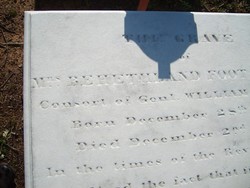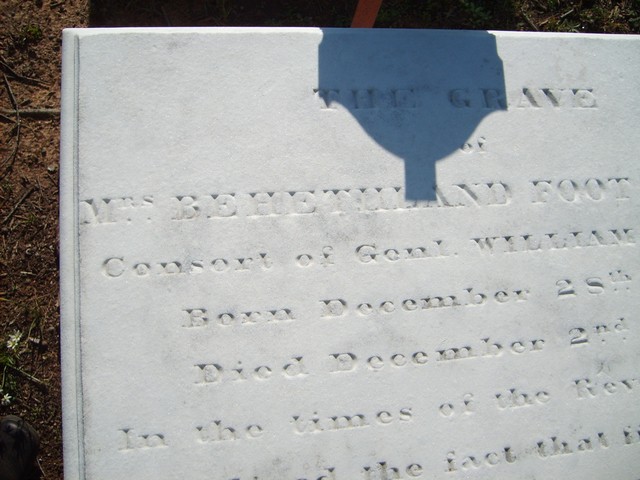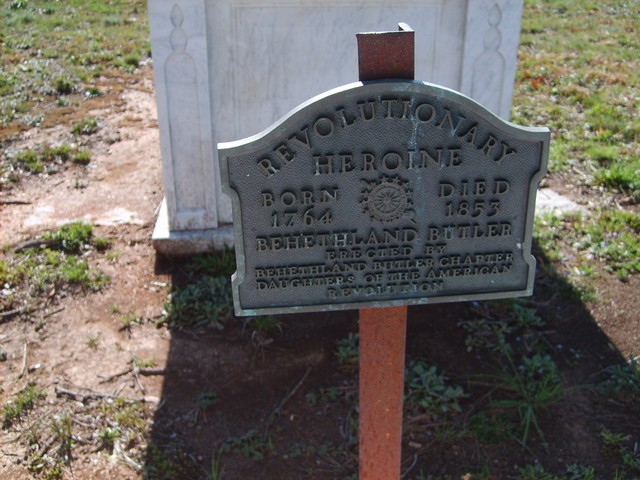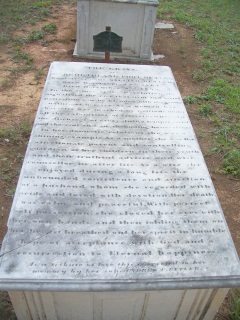(from The Edgefield Advertiser, December 7, 1853, Editorial)
Daughter of Francis "Frank" (Capt.) MOORE 1740 – 1770 and Frances FOOTE 1742 – 1857
Married William (Maj. Gen.) BUTLER 1759 – 1821; parents of:
George BUTLER 1785 – 1827
William (Congressmand and Dr.) BUTLER 1790 – 1850
Frank Moore (Col.) BUTLER 1793 – 1827
Andrew Pickens BUTLER 1796 – 1857
James BUTLER 1796 – 1850
Pierce Mason BUTLER 1798 – 1847
Emmala Elizabeth BUTLER 1800 – 1848
Leontine (Col.) BUTLER 1802 – 1827
"Behethland Butler Chapter, Daughters of the American Revolution was named for a South Carolina heroine of that War – Behethland Foote Moore, born December 24, 1764, in Fauquier County, Virginia. Her father was Captain Frank Moore, who commanded one of the Virginia troops at Braddock's defeat. Her mother was Frances Foote. About 1768, five years after the marriage of her parents, they moved to South Carolina and settled on Little River in Laurens District, where Captain Moore died two years afterward. His widow entered a second marriage with Captain Samuel Savage, who in 1774 moved to Edgefield District and made his residence on the Saluda River, just above Saluda Old Town, and here the family resided. Behethland's education was given more care than usually bestowed on young girls. She went to school in Camden, and while there took great pleasure in looking at the soldiers in the command of Count Pulaski as they passed through en route to Charleston. In 1781 she returned home, where the terrors of war came to her very door. On at least two occasions the intrepid girl braved plunderers for the protection of her father's property or on a point of honor.While she resided at home, it became necessary to convey intelligence of danger to Captain Wallace, who was in command of a small force on the other side of the Saluda. There was difficulty in doing this, as no male messenger could be procured. Miss Moore, at the time but fifteen years old, volunteered to undertake the service. Accompanied by her little brother, and a friend named Fanny Smith, she went up the river in a canoe in the middle of the night, gave the warning to Captain Wallace, and through him to Colonel Henry Lee.The next morning a young American officer, who had been below on some reconnoitering service, rode up to the house to make a few inquiries. These were answered by the young lady, who, it is said, was somewhat struck with the appearance of the handsome man in dragoon uniform. This was the first occasion on which she saw her future husband. It was not long before the courtship took place, followed by marriage in 1784. The young people took possession of a small farm which Captain Butler had inherited from his father, near Mount Willing. Fourteen years afterward they moved to an estate on one of the branches of the Saluda River, where they continued to live until his death in 1821.General Butler was almost constantly engaged in public service and was necessarily absent from home a great part of the time, in Congress from 1801 to 1814, and commanding the South Carolina forces as Major General during 1814 and 1815. The care not only of his family bit also of his plantation and business devolved upon Mrs. Butler. She had the care of a family of seven sons and one daughter, the support of which was derived from mainly from the produce of a small farm. She undertook the superintendence of her children's education and especially their moral training. The careers of her children reflect the excellence of their noble mother. Behethland Butler is buried near Saluda, South Carolina, at the old Butler cemetery adjoining the Butler Methodist Church."
Prepared by Mrs. S.H. Bowen from Elizabeth F. Ellet's "The Women of the American Revolution," Volume II, George W. Jacobs & Co., Philadelphia, 1900, pp. 111-123. Also published in the 1976-77 Behethland Butler Chapter Yearbook.
(from The Edgefield Advertiser, December 7, 1853, Editorial)
Daughter of Francis "Frank" (Capt.) MOORE 1740 – 1770 and Frances FOOTE 1742 – 1857
Married William (Maj. Gen.) BUTLER 1759 – 1821; parents of:
George BUTLER 1785 – 1827
William (Congressmand and Dr.) BUTLER 1790 – 1850
Frank Moore (Col.) BUTLER 1793 – 1827
Andrew Pickens BUTLER 1796 – 1857
James BUTLER 1796 – 1850
Pierce Mason BUTLER 1798 – 1847
Emmala Elizabeth BUTLER 1800 – 1848
Leontine (Col.) BUTLER 1802 – 1827
"Behethland Butler Chapter, Daughters of the American Revolution was named for a South Carolina heroine of that War – Behethland Foote Moore, born December 24, 1764, in Fauquier County, Virginia. Her father was Captain Frank Moore, who commanded one of the Virginia troops at Braddock's defeat. Her mother was Frances Foote. About 1768, five years after the marriage of her parents, they moved to South Carolina and settled on Little River in Laurens District, where Captain Moore died two years afterward. His widow entered a second marriage with Captain Samuel Savage, who in 1774 moved to Edgefield District and made his residence on the Saluda River, just above Saluda Old Town, and here the family resided. Behethland's education was given more care than usually bestowed on young girls. She went to school in Camden, and while there took great pleasure in looking at the soldiers in the command of Count Pulaski as they passed through en route to Charleston. In 1781 she returned home, where the terrors of war came to her very door. On at least two occasions the intrepid girl braved plunderers for the protection of her father's property or on a point of honor.While she resided at home, it became necessary to convey intelligence of danger to Captain Wallace, who was in command of a small force on the other side of the Saluda. There was difficulty in doing this, as no male messenger could be procured. Miss Moore, at the time but fifteen years old, volunteered to undertake the service. Accompanied by her little brother, and a friend named Fanny Smith, she went up the river in a canoe in the middle of the night, gave the warning to Captain Wallace, and through him to Colonel Henry Lee.The next morning a young American officer, who had been below on some reconnoitering service, rode up to the house to make a few inquiries. These were answered by the young lady, who, it is said, was somewhat struck with the appearance of the handsome man in dragoon uniform. This was the first occasion on which she saw her future husband. It was not long before the courtship took place, followed by marriage in 1784. The young people took possession of a small farm which Captain Butler had inherited from his father, near Mount Willing. Fourteen years afterward they moved to an estate on one of the branches of the Saluda River, where they continued to live until his death in 1821.General Butler was almost constantly engaged in public service and was necessarily absent from home a great part of the time, in Congress from 1801 to 1814, and commanding the South Carolina forces as Major General during 1814 and 1815. The care not only of his family bit also of his plantation and business devolved upon Mrs. Butler. She had the care of a family of seven sons and one daughter, the support of which was derived from mainly from the produce of a small farm. She undertook the superintendence of her children's education and especially their moral training. The careers of her children reflect the excellence of their noble mother. Behethland Butler is buried near Saluda, South Carolina, at the old Butler cemetery adjoining the Butler Methodist Church."
Prepared by Mrs. S.H. Bowen from Elizabeth F. Ellet's "The Women of the American Revolution," Volume II, George W. Jacobs & Co., Philadelphia, 1900, pp. 111-123. Also published in the 1976-77 Behethland Butler Chapter Yearbook.
Inscription
D A R marker
Family Members
Advertisement
Explore more
Sponsored by Ancestry
Advertisement















